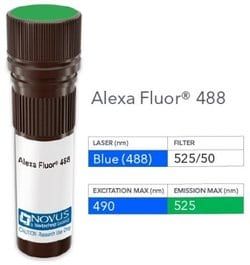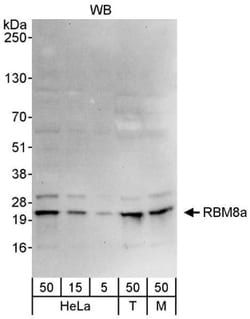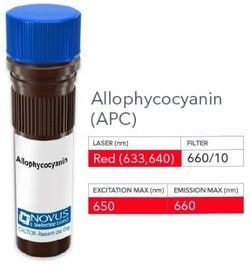Retinol Binding Protein RBP Antibody (RBP/872) - IHC-Prediluted, Novus Biologicals™
Manufacturer: Novus Biologicals
Select a Size
| Pack Size | SKU | Availability | Price |
|---|---|---|---|
| Each of 1 | NBP248406-Each-of-1 | In Stock | ₹ 45,078.50 |
NBP248406 - Each of 1
In Stock
Quantity
1
Base Price: ₹ 45,078.50
GST (18%): ₹ 8,114.13
Total Price: ₹ 53,192.63
Antigen
Retinol Binding Protein RBP
Classification
Monoclonal
Conjugate
Unconjugated
Formulation
10mM PBS and 0.05% BSA with 0.05% Sodium Azide
Gene Symbols
RBP1
Immunogen
Recombinant human retinol binding protein-1 (RBP1)
Quantity
7 mL
Primary or Secondary
Primary
Test Specificity
Recognizes a protein of 21kDa-25kDa, identified as retinol binding protein-1 (RBP1). This protein belongs to the lipocalin family and is the specific carrier for retinol (vitamin A alcohol) in the blood. It delivers retinol from the liver stores to the peripheral tissues. In plasma, the RBP-retinol complex interacts with transthyretin, which prevents its loss by filtration through the kidney glomeruli. A deficiency of vitamin A blocks secretion of the binding protein post-transnationally and results in defective delivery and supply to the epidermal cells.
Content And Storage
Store at 4C.
Isotype
IgG1 κ
Applications
Immunohistochemistry (Paraffin)
Clone
RBP/872
Dilution
Immunohistochemistry-Paraffin
Gene Alias
C, Cellular retinol-binding protein, CRABP-I, CRBP1CRBP-I, CRBPCellular retinol-binding protein I, CRBPI, RBPC, retinol binding protein 1, cellular, retinol-binding protein 1, retinol-binding protein 1, cellular
Host Species
Mouse
Purification Method
Protein A or G purified
Regulatory Status
RUO
Gene ID (Entrez)
5947
Target Species
Human, Mouse, Rat, Goat, Monkey, Rabbit
Form
Purified
Description
- Retinol Binding Protein RBP Monoclonal specifically detects Retinol Binding Protein RBP in Human, Mouse, Rat, Goat, Monkey, Rabbit samples
- It is validated for Immunohistochemistry, Immunohistochemistry-Paraffin.





